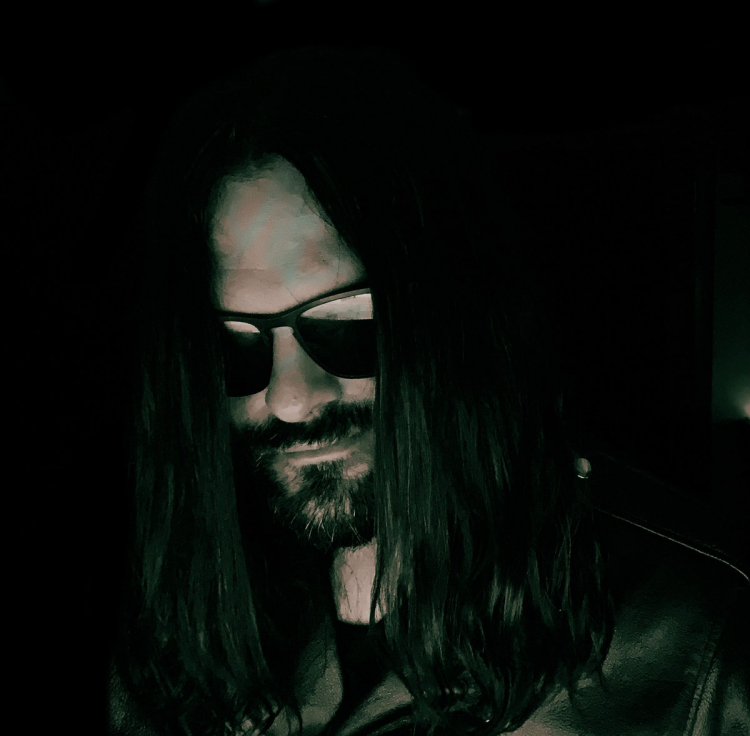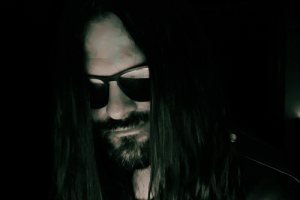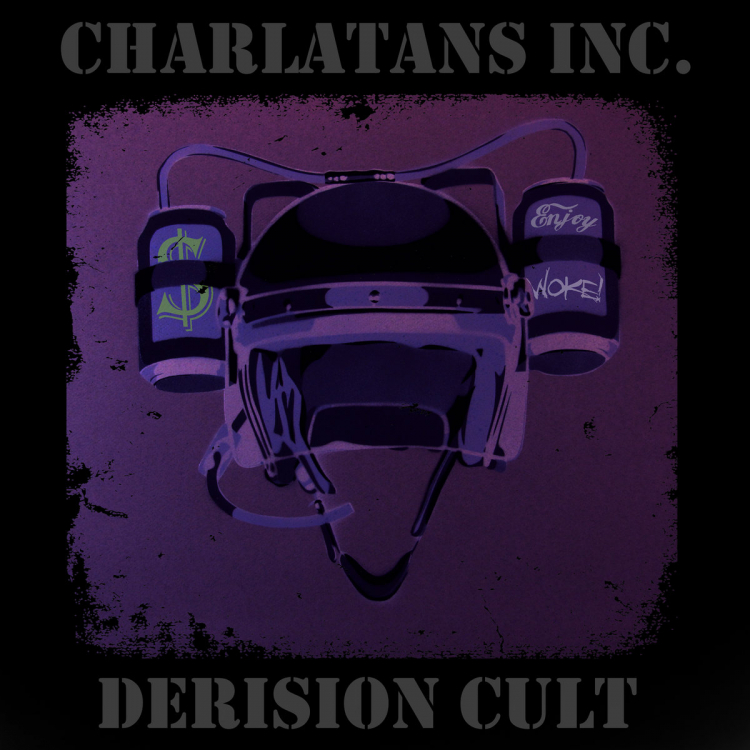Hello Dave and welcome to Brutal Resonance! Let’s start with a basic but important question. What are three of your favorite albums of all time and why?
Dave: Thanks! It’s funny I haven’t really been asked that. There’s albums that influence me artistically and then ones that just plain are important albums to me as a person. In thinking about it from the latter perspective: David Bowie'S "Outside". This was a hugely influential album for me musically (even though it’s a million miles from Derision Cult). That album was my gateway into Bowie (I came, like a lot of people my age through the NIN association from that era). I loved the overall vibe and how otherworldly that album sounded. I’d never really heard anything like it. I still haven’t. Iggy Pop's "Lust for Life". It’s really hard to nail Iggy down to one album or band for that matter, but this one is it for me. It’s impossible to put it on without ending up with a smile on your face. To me, this is what rock and roll is supposed to sound like. It’s raw, but you can tell it’s been thought out. It’s visceral but relatable. It’s def one I’ll grow old listening to. Black Sabbath's "Vol 4". If we’re going for all time this is ground zero for me. It’s the one that made me want to play guitar and set me on a course when I first heard it. I think a neighbor kid brought it over. It’s still the perfect hard rock album to me. Shades of light and dark.
Derision Cult got its start in 2014 as far as I can see. What was the initial goal of the project? Did you have a set sound in mind, or where you’d want to be at a certain point?
Dave: Yeah I started self-releasing then. I was in bands for years in the 90’s in Iowa which was a pretty vibrant time and place for industrial and metal (Slipknot came out of that scene). It was a lot of fun but bands fizzled out and I ended up moving to Chicago for work and really didn’t play at all for years but I always missed it. I had this silly notion that you can’t be serious about art and also have a serious career. But then I learned a little more about the movers and shakers in the Chicago scene and all the things outside of music they’re doing. The spark for me to jump back into music was coming across Jim Marcus (Die Warzau, Go Fight) in the halls of our respective ad agency headquarters on Michigan Ave in Chicago. In addition to being a preeminent figure in the Chicago music and worldwide industrial scenes, he’s also a highly respected creative director. At the time, he’d just kicked off things with Go Fight. So here’s this guy who is not only crushing it in the ad industry, but he’s making some of the most vital music of his career. That really inspired me. Very quickly, the punk side of my ethos came out and I decided I wanted this project to be a vehicle to comment on societal things. But I had no real plan in mind as far as aspirations when I started, other than to assemble a track in a DAW from soup to nuts that I could point to and say, “Look I made that!” But as time goes on, I’m getting into other aspects like videos and promotion.

Where does the name Derision Cult stem from and what does it mean to you?
Dave: I originally had that as a song title called Cult of Derision. It is a term I saw an article use to describe movies that are so bad they sort of get a cult following of people who just love to hate them (I’m pretty sure
The Room was the movie in question). That idea was really interesting to me - like minded people who come together over a collective derision about something. And it happens all the time doesn’t it? Look at movements like Black Lives Matter. At its core, this is a movement coming together over their collective disdain for systemic racism. In a roundabout way, that derision brings people together. If you’re going to write about hot button issues, that’s essentially what you’re attempting to do right? I played around with the phrase and Derision Cult was born.
You have your fifteenth release incoming, and I believe your ninth album, coming up soon. Do you ever feel as if you release too much music? What’s your philosophy on that?
Dave: Yes I most definitely do think I went overboard a bit on releases early on! For the first few years, I didn’t really think about promoting or even if people would hear it. I’d put two EP’s a year up on Bandcamp and call it good. So that created a lot of releases. Plus for the most part it’s just me so I’m not corralling band members or fitting in tours and stuff which makes creating music a lot easier to do. But the more I do it, the more I put into each release, "Charlatans Inc" being by far the most. And to your point about releasing too much - I’d like to try to leave people wanting more, not wishing they’d heard less!
Your new album is titled “Charlatans Inc.”. Tell me about the overall theme of the album.
Dave: The album deals with a lot of disingenuous motives in the media and the things that fuel it. There’s an online payments company whose CEO got sued by shareholders for mismanaging shares to himself that is at the forefront of this minimum wage issue. There’s an auto company that ran a superbowl campaign saying we should all empower women in the workplace and encourage them to be leaders while they themselves hadn’t had a single woman on their board of directors in over one-hundred years in business. There’s a couple big social media platforms that have run ad campaigns promoting diversity and inclusion but their algorithms are designed to manufacture conflict and sort of amplify people’s tribal instincts. I wanted to say something about that and Charlatans Inc is how I sum that whole thing up.
Consumerism is a major theme on the album. You had a front row seat as an exec in the advertising industry. How has that experience changed you? Do you see the corporate world differently?
Dave: I don’t know that I see the corporate world any differently. The corporate world is like any line of work, people make their living and support themselves working in that world and that’s all well and good. My experiences in the industry have been really great, but its really made me more cognizant of how intertwined the news and media are with branding and consumer behavior. I pay a lot more attention to what kind of emotion a story or a commercial is trying to evoke from me. I think it’s important everybody does that nowadays because we get it in the face so much. Selling products has always been about creating illusions to make something seem like more than it is. You’re gonna get more girls if you drink this kind of beer. You’re more sophisticated and cosmopolitan if you use that dishwasher detergent. You’d be like Beyoncé if you drank Pepsi! That’s the mad men type stuff that goes back to the 60’s. And that kind of thing is harmless and can be fun. I don’t think any sane person takes that stuff literally but we internalize and associate those feelings with a brand. But some of that started changing around fifteen years ago and got less playful. I noticed Corporate Social Responsibility became a hot topic in brand strategy meetings. Prior to that, nobody really gave a shit what the manufacturer of your cars’ opinion was on pay gaps or how committed to ending racism your breakfast cereal is. Or at least those marketing those products didn’t think they did. And there’s nothing wrong with that in and of itself. In many cases, a lot of good has come from it in terms of eliminating bad behavior from the workplace or using recyclable packaging materials. But a watershed moment that really caused me to change was the Nike campaign where they signed Colin Kaepernick as part of their slogan anniversary. I was somewhat close to that project although I wasn’t directly involved. I know it was totally data driven. They’d done surveys and focus groups around what the next big buying cohort of their products would be. They knew their growing cohort was urban twenty-somethings who trended liberal in their views and were more apt to wear that on their sleeve (literally and figuratively) than their predecessors. The magic of a good campaign is it feels really natural - you don’t see the seams and it doesn’t feel contrived, even though every inch of them are meticulously thought out when those kind of dollars are involved. Part of the plan was to elicit a negative reaction from people who didn’t like Colin or what he was doing. Sort of like that old Metallica song says “Energy Derives from both the plus and negatives”. So part of the campaign depended on shoe burnings, temporary stock dips, Twitter hate from people like Donald Trump. The ads with him saying “Believe in Something Even if it means Sacrificing Everything” and the press releases were strategically placed to make sure that happened. All of that suddenly changed what it meant to have a Nike logo on your shirt or shoes or whatever. Now it says something about who you are politically which is exactly what that buying cohort is out there looking for in a brand. That really struck me. Like “wow, all of this provocation and manipulation just to sell those kids more fucking shoes.” And it worked! Nike added 26 billion to its market cap after the dust settled on that campaign. They couldn’t have orchestrated it any better than they did. I don’t think any of this makes them bad people, they’re doing their job - it really falls to us as the public to have a sense of these things and manage our thought processes about them accordingly. Whatever your personal beliefs or moral code happens to be is irrelevant. There’s going to be a role you might unwittingly play. Last year I was approached by a gun manufacturer who wanted to make and market an AR-15 for kids. It was a kids’ safety gun and apparently they’d gotten a patent on a safer trigger mechanism to teach a kid to hunt without risk of it going off when it isn’t supposed to. So it had an actual application, but that wasn’t the point. They very deliberately picked the AR-15 style and wanted me to help them leak the story and the product to places like the Daily Show and MSNBC because they knew if those places would run pieces on the audacity of a company to make an assault rifle for kids. They fully expected a huge backlash all over social media. But at the same time, it’d actually cause gun enthusiasts to buy MORE guns and ammo once the backlash kicks into gear. The madder people on the control issue get, the more guns get sold. They had all the historical data that showed this is very likely what would happen. I didn’t work with them for a myriad of reasons, ethics among them, and I don’t think that gun ever saw the light of day. But I think these kinds of things are what is in store for all of us and we have to be wise to it because it is so sophisticated and manipulative. They don’t want you to think, they want you to feel. Enragement equals engagement. These experiences played really heavily into what I want to say on this album.
The cover art is interesting; it shows a booze helmet with one side having a dollar symbol and the other reading “Enjoy WOKE!” What is this supposed to represent?
Dave: Thanks! It’s a piece called
Riot Party that an Iowa artist named Bret Miller created for this. His art is a lot like what I do….He’ll address conflicts between consumerism and social justice. He and I had a lot of conversations about using social issues and civil unrest to market products and how to visualize that.
Riot Party is a mashing up of a booze helmet with a police riot helmet. Then on one side you have a can with a dollar sign and on the other you’ve got a subversion of a famous old brand slogan. We wanted to show how those iconic brands are coming off the sidelines and getting into the fray now. I’m old enough to remember new Coke and the old Enjoy Coca-Cola and Enjoy Coke slogans. Riots and civil outrage are big business!
Out of the eight tracks on “Charlatans Inc.”, which one is your favorite and why?
Dave: I go back and forth. Personally I’m really liking 'Amplify' right now. I believe it’s the shortest track I’ve ever written, but it just goes in, hammers a point and goes home. There’s some weird humor parts in it that I thought were a good juxtaposition. The song is about sort of the hive mind mentality of social media and how those technologies know so much about us because of what we share. The music on that track was sort of like my own little personal heavy bag (same with 'Call a Man God'). Like a lot of people, the pandemic hurt my livelihood and that’s a really stressful place to be in. I dealt with a lot of that anxiety and stress by just bashing out the heaviest loudest riffs I could. Some of it was just unusable but some ended up like this track. There’s something about just finding a riff and hammering on it that is good for the soul! This is one that comes up on my workout playlist a lot nowadays.
And what else do you have planned for 2021? Do you have any other singles, EPs, remixes, or shows in the works? Well this is probably it for Derision Cult for 2021.
Dave: I don’t have any remixes planned for these. But I’ve got a project called Sys Machine that Kim from Bow Ever Down and I did earlier this year we’re going to put out probably around mid-late November. I’m really excited about that too. It’s very different from this. Much more electronic, slower and introspective. I left the heavy guitars hanging on the wall for that one! Then next year I’ll start working on the next chapter for Derision Cult and spend a year or so getting that ready.
Lastly, I’d like to thank you for your time. I wish you the best of luck and leave the space below open for you to mention anything I may have missed.
Dave: Thanks a lot man! These are great questions!
This interview was commissioned through our Ko-fi page.







